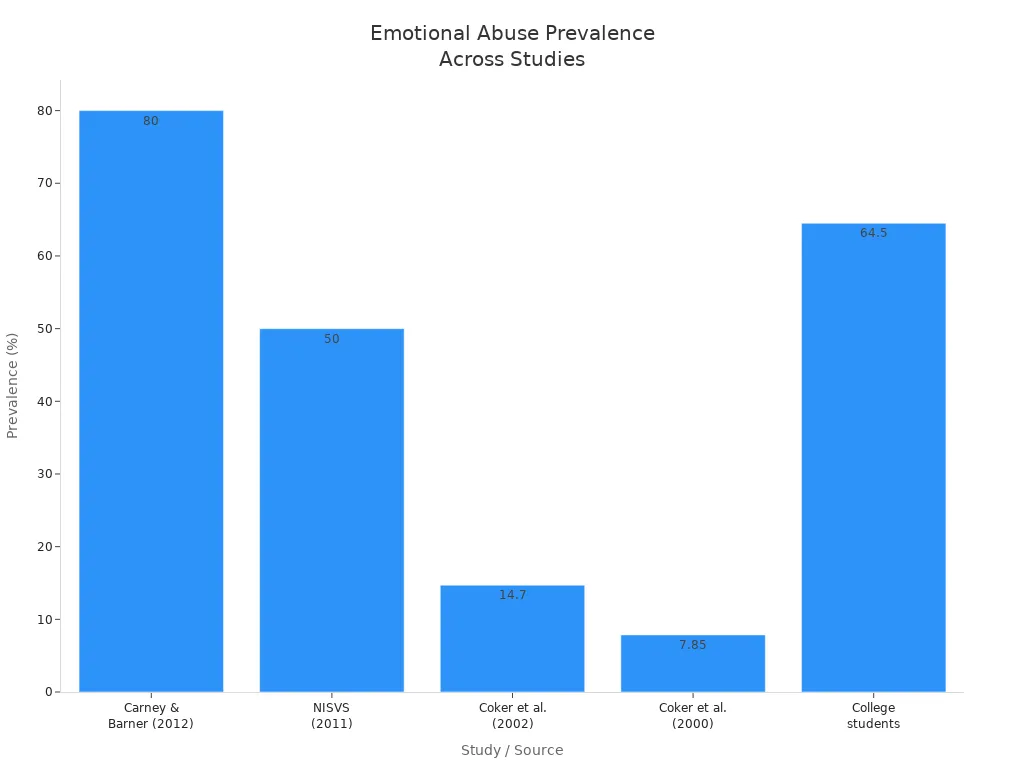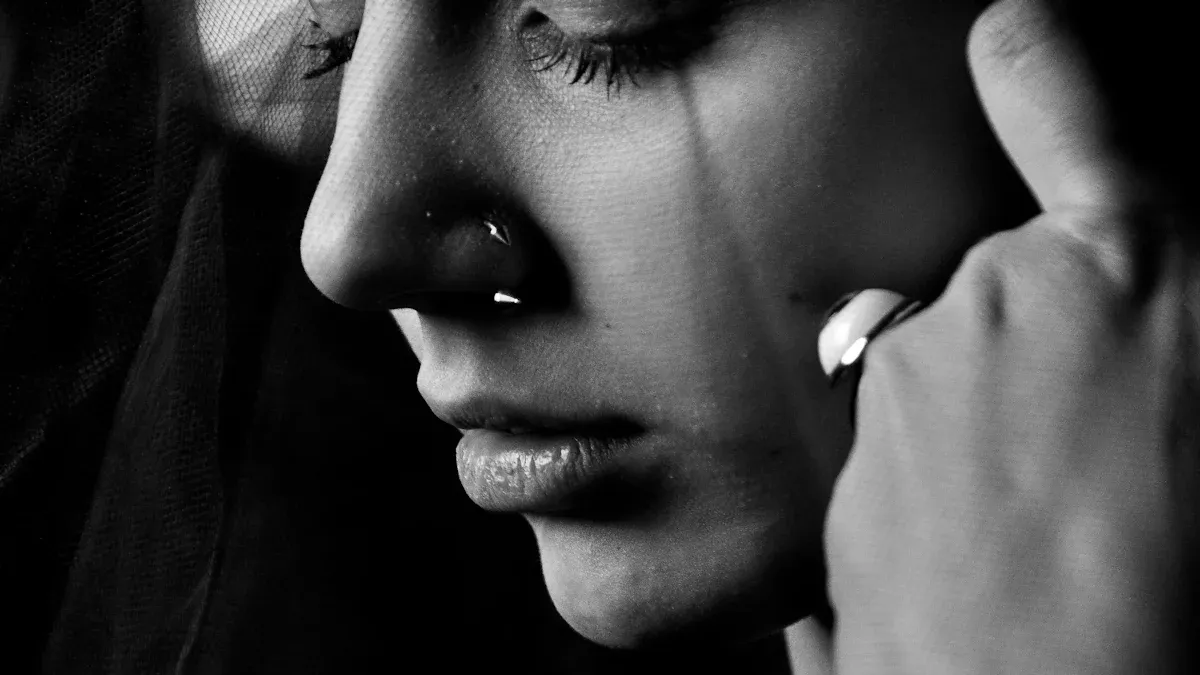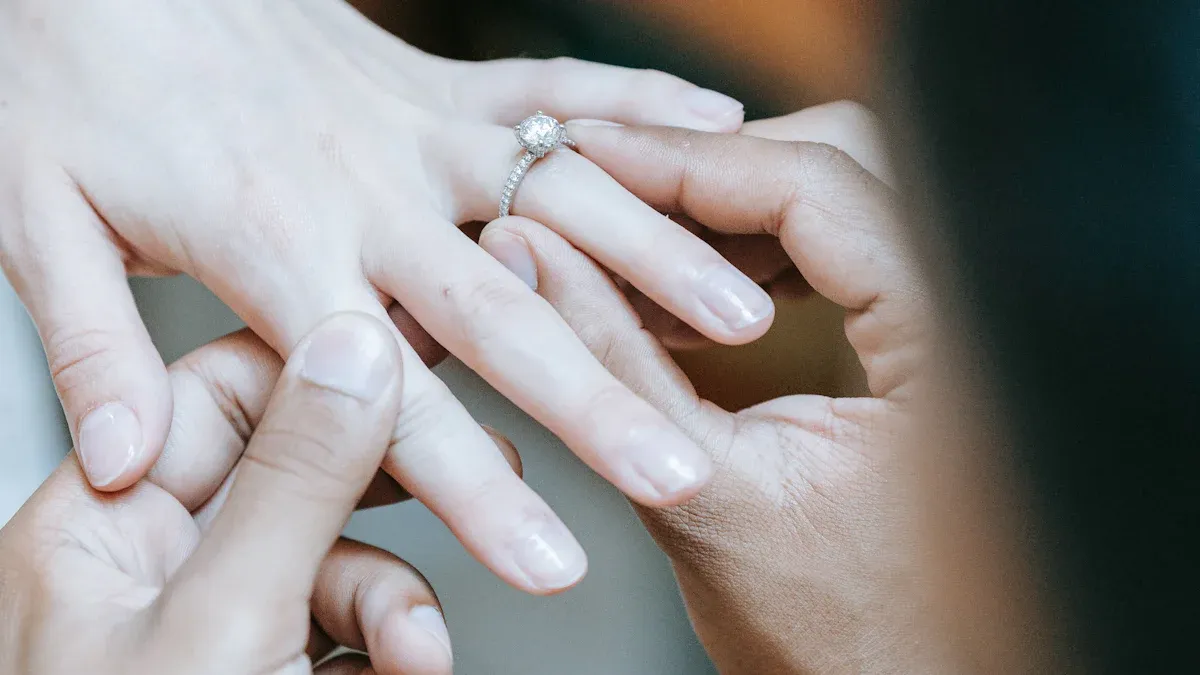How to recover from an emotionally abusive relationship

You may feel alone after an emotionally abusive relationship, but you are not. Many people have felt this pain too. Look at these numbers:
Study / Source | Population | Emotional Abuse Prevalence (%) | Notes |
|---|---|---|---|
Carney & Barner (2012) Meta-analysis | General IPV victims | About 80% average prevalence | Includes expressive aggression and coercive control |
NISVS (Black et al., 2011) | US adults | About 50% lifetime emotional abuse | Psychological aggression: 48.4% women, 48.8% men |
Coker et al. (2002) | Women (n=6,790), Men (n=7,122) | Psychological abuse alone: 12.1% women, 17.3% men | Physical, sexual, or psychological IPV: 29% women, 23% men |
Coker et al. (2000) | Men (n=243), Women (n=313) | Perceived emotional abuse: 7.4% women, 8.3% men | Smaller sample, similar rates by gender |
College student samples | College students | 40%-89% perpetration rates | High rates of emotional abuse perpetration |

You deserve help and time to heal, no matter what. Healing does not have to look the same for everyone. Some people think emotional abuse is not serious, but it can hurt a lot. If you need help, ask for it. Everyone who has been in an abusive relationship deserves care and hope.
Key Takeaways
Notice emotional abuse by looking for controlling or mean actions that hurt your feelings or make you feel unsafe. Understand that getting better takes time. Support from friends, family, or helpers can make you feel safer and stronger. Keep yourself safe by making a plan. Find safe places and protect your privacy and money. Set clear rules to keep yourself safe. Take care of yourself with therapy, good habits, and fun activities to get stronger again. Be patient with yourself. Celebrate small steps forward. Remember that healing is your own journey and it can go up and down.
Recognizing Emotional Abuse
Signs of Emotional Abuse
You may wonder if your experience was emotional abuse. It can be hard to tell because there are no marks. Here are some signs you might see in an emotionally abusive relationship:
Someone controls what you do or follows you everywhere.
They ask for your passwords or stop you from using money or devices.
They shame you with long talks, get angry, or ignore your worries.
They blame you, act jealous, or pretend to be the victim to make you feel bad.
They embarrass you in front of others, call you names, or cheat to hurt you.
They change moods fast, gaslight you, or act nice around others but not you.
They keep you away from friends and family, hide your keys, or lock you in.
They say they will hurt you, your loved ones, or themselves.
They refuse to listen or act confused, making you doubt your memory.
If you notice these signs of emotional abuse, you are not alone. Many people have trouble seeing these patterns. It is okay to ask for help.
Important Resource: If you're questioning whether you experienced gaslighting or feeling unsure about your own perceptions and memories, Gaslighting Check can help you understand these manipulation patterns. This tool is designed to help you recognize when conversations cross into emotional manipulation territory and can provide clarity when you're doubting your own reality—a common experience for those who have faced emotional abuse.
Understanding the Cycle
Emotional abuse often happens in a cycle. Experts call this the cycle of abuse. Knowing about the cycle can help you see why leaving is hard or why it is hard to help someone.
Tension Building: Stress grows. The abuser gets upset or blames you for little things.
Abusive Incident: The abuser yells, insults, or does something mean to take control.
Reconciliation (Honeymoon Phase): The abuser says sorry, makes excuses, or acts loving to win you back.
Calm: Things seem okay for a while, but the problems stay. The cycle usually starts again.
This cycle can make you feel stuck. You may hope things will change, but the pattern often repeats. Seeing this cycle is a big step toward healing from emotional abuse.
Impact of an Emotionally Abusive Relationship

Emotional and Psychological Effects
Leaving an emotionally abusive relationship can make you feel many things. These feelings can show up right away or much later. You might notice changes in your thoughts, feelings, or actions. Here are some effects you might have:
You may feel lonely or far from others.
You might doubt yourself or feel ashamed.
You could feel confused or scared in new places.
Anxiety might make it hard to be around people.
You may feel stuck or like you have no power.
As time goes on, these effects can get worse. You might see:
You feel stressed all the time or always worried.
It can be hard to trust even good people.
Your body might hurt or feel tight.
You may have trouble sleeping or bad dreams.
You might feel nothing or lose interest in things you liked.
Effect Type | Psychological Effects |
|---|---|
Short-term | Feeling confused, scared, hopeless, or ashamed; trouble focusing, mood changes, tense muscles, nightmares, aches |
Long-term | Depression, anxiety, PTSD, stress that does not go away, low self-esteem, staying away from people, guilt, trouble sleeping, pain that lasts |
Emotional abuse can also hurt your body. You might get headaches, stomach pain, or feel tired a lot. If you do not heal, you could have bigger health problems, like pain that will not go away or trouble moving.
Why Healing Takes Time
Getting better after trauma is not fast or simple. How long and how bad the abuse was matters. If you were hurt for a long time, or if other abuse happened too, healing can take longer. You might still feel scared, tense, or worried after leaving. Some people feel jumpy, like something bad could happen at any time.
Having support from friends, family, or a therapist can help you heal. When people care and listen, you feel safer and more hopeful. Your own strength and how ready you are also matter. Sometimes, it takes time to see how much the abuse hurt you. Everyone heals in their own way, but you can get better at your own speed.
Healing from Emotional Abuse
Prioritizing Safety and Well-being
Your safety comes first when you start to heal from emotional abuse. You may feel scared or unsure about what to do next. That is normal. You can take steps to protect yourself and feel more secure.
Plan your escape in secret. Use safe devices to talk to people you trust. Make a safety plan with emergency contacts and safe places.
Know where you can go if you need to leave fast. Trusted friends, family, shelters, or a domestic violence hotline can help.
Open a new bank account that your abuser cannot reach. Save money if you can. Some groups offer financial support for people leaving abuse.
Change your passwords and use two-factor authentication. Use devices your abuser cannot access. Adjust privacy settings and block the abuser online.
Find safe housing. Stay with friends, family, or at a shelter. You can also look for short-term rentals or support programs.
Build a strong support network. Join support groups, connect with friends and family, and keep in touch with people who care.
If you ever feel in danger, call a domestic violence hotline right away. They can guide you and help you stay safe.
You may face barriers like fear, shame, or worry about what others will think. Some people feel tired after so much stress. Others worry about money or their children. These feelings are common. You deserve help and support as you heal from emotional abuse.
Setting Healthy Boundaries
Setting boundaries helps you protect yourself and start to heal from emotional abuse. You may find it hard at first, especially if your abuser tries to control you or gets angry when you say no. Boundaries are not about changing the other person. They are about taking care of yourself.
Tell the person clearly and calmly that their behavior must stop.
If they do not listen, leave the room or find a safe space.
Repeat these steps every time the abuse happens. Stay calm and do not react with strong emotions.
If you feel unsafe, stop and get outside help from a counselor or a domestic violence hotline.
Boundaries work best when you enforce them yourself. You do not need the abuser’s agreement. If you let bad behavior slide, the cycle of emotional abuse can start again. Consistency is key. If you feel unsafe or the abuse gets worse, reach out for help right away.
Tip: Write down your boundaries and what you will do if someone crosses them. This can help you stay strong and remember your plan.
Self-Care Practices
Taking care of yourself is a big part of healing from emotional abuse. Self-care is not selfish. It helps you feel better and rebuild your strength.
Try therapy. Therapy gives you a safe place to talk about your feelings and learn new ways to cope. Therapists use methods like CBT and EMDR to help you process trauma and change negative thoughts.
Create a daily routine. Simple habits like waking up at the same time, eating regular meals, and planning your day can make life feel more stable.
Move your body. Exercise like walking, yoga, or dance can lift your mood and help your body release stress.
Eat healthy foods and drink water. Good nutrition supports your mind and body.
Get enough sleep. Try to go to bed and wake up at the same time each day.
Practice relaxation. Breathing exercises, meditation, or gentle stretching can calm your mind.
Express yourself. Draw, write, play music, or do crafts. Creative activities help you release feelings and find joy.
Use positive affirmations. Remind yourself every day that you are strong and worthy of love.
Connect with others. Support groups, friends, and family can help you feel less alone. Sharing your story with people who understand can bring comfort.
Remember: You do not have to do this alone. Therapy and support from others can make a big difference. If you ever feel overwhelmed, reach out for help.
Healing from emotional abuse takes time. You may have good days and hard days. That is okay. Be gentle with yourself and celebrate every step forward.
Rebuild Self-Worth and Trust

Heal from an Abusive Relationship
Healing after emotional abuse takes time and bravery. You might feel confused or not know who you are. This is normal. Emotional abuse can make you question your value and feel weak. To start healing, notice your feelings and what upsets you. Writing in a journal helps you see what happens often and how you change. Mindfulness and deep breathing can help calm you when you feel nervous. Try to be kind to yourself, even if you mess up. Self-love grows when you accept your flaws and speak nicely to yourself.
Having people to support you is important. Friends, family, or support groups can remind you that you matter. Therapy is a safe place to talk about your pain and learn new ways to heal. Remember, you made it through something very hard. Every step you take shows you are strong.
Rebuilding Confidence
Emotional abuse can hurt your confidence. You might feel nervous about making choices or trusting yourself. That is okay. Start with small choices, like picking your clothes or food. Celebrate when you do these things. Setting boundaries helps you feel in charge again. Your needs are important, and you deserve respect.
Tip: Show self-love by writing three things you like about yourself each day.
Taking care of yourself is important. Sleep, healthy food, and moving your body help you heal. Therapy can help you change negative thoughts and feel better about yourself. Good friends and family can help you see your strengths and trust yourself again.
Managing Difficult Emotions
You may feel anger, sadness, or fear as you heal. These feelings are part of getting better. Try different ways to cope:
Use mindfulness or meditation to stay calm.
Draw, play music, or write to share your feelings.
Talk to someone you trust or join a support group.
Say positive things like “I am strong” or “This feeling will pass.”
Solving problems and making plans can help you feel less stressed. Therapy and self-care help you heal your emotions. Remember, loving yourself means being gentle, even on hard days.
Moving Forward After Emotional Abuse
Being Patient with Yourself
Healing from emotional abuse takes time. You might want to feel better right away, but real change happens slowly. Patience helps you manage tough days and setbacks. When you practice patience, you give yourself space to feel and grow. Here are some ways patience supports your journey:
You learn to handle frustration and bounce back after hard moments.
Patience helps you treat yourself with kindness, even when things feel messy.
You set realistic goals and focus on small wins, not just big changes.
You stop comparing your healing to others and honor your own path.
Patience builds healthy habits and lowers stress, making recovery last.
Mindfulness, setting simple goals, and joining supportive communities can help you stay patient.
Over time, patience lets you grow stronger and kinder to yourself.
Healing is not a race. Every step forward, no matter how small, matters.
Maintaining Progress
Staying on track after emotional abuse means using tools that work for you. Many people find that support groups make a big difference. These groups give you a safe place to share, learn, and connect with others who understand. You can also try therapy, which helps you spot triggers and learn new ways to cope.
Some helpful strategies include:
Journaling to sort out your feelings and notice patterns.
Practicing mindfulness or deep breathing to calm your mind.
Building a strong support system with friends, family, or professionals.
Setting healthy boundaries and celebrating your progress.
Setbacks can happen. You might feel sad, angry, or blame yourself. Remember, this is normal. Healing is not a straight line. If you struggle, reach out for help. Talk to someone you trust or join a group. You can also use self-care, like exercise or hobbies, to lift your mood.
No matter your background, you can heal from emotional abuse. People from all walks of life have found hope and strength with the right help and support. You are not alone, and your story matters.
You have taken brave steps toward recovery. Healing from emotional abuse means rebuilding your self-worth, setting boundaries, and finding support. Remember, recovery is not a straight line. You may face setbacks, but each small win matters.
Give yourself permission to rest and be patient.
Reach out for help when you need it—support groups, therapy, and hotlines are always there. You are not alone, and your recovery journey shows your strength and hope.
FAQ
What if I still miss my abuser?
Missing your abuser is normal. Emotional bonds can feel strong, even after harm. Try to focus on your healing. Talk to someone you trust or join a support group. You are not alone in these feelings.
How long does it take to heal from emotional abuse?
Healing takes time. Some people feel better in months. Others need years. Your journey is unique. Celebrate small steps. Be patient with yourself. If you feel stuck, reach out for help.
Can I ever trust someone again?
Yes, you can trust again. Start with small steps. Let people earn your trust over time. Notice how they treat you. Trust grows slowly. Give yourself permission to move at your own pace.
Should I tell my friends and family about the abuse?
Sharing your story can help you heal. Choose people who listen and support you. You decide how much to share. If you feel unsafe, talk to a counselor first. Your safety comes first.
What if I feel angry or ashamed?
These feelings are common. You did nothing wrong. Try writing about your feelings or talking to someone you trust. Remember, healing means accepting all your emotions. You deserve kindness and understanding.